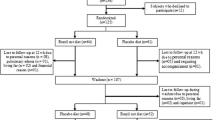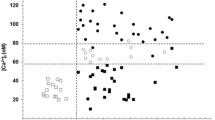Abstract
Objective: Adult GH deficiency (GHD) syndrome is characterized by increased risk of atherosclerosis and hence of cardio- and cerebrovascular mortality. Oxidative stress appears to play an important role in early atherogenesis. Oxidized LDL represents an important predictor of cardiovascular risk and is mainly responsible for oxidative damage of the endothelium. Its concentrations are increased in GHD, but the association between this abnormality and oxidative stress is still unclear, due to the discordant results yielded by the few available studies. Design and methods: In 13 GHD patients, plasma lipid peroxide concentrations were measured before and after a 4-month treatment with recombinant human GH (rhGH) and compared with those of 13 age-and sex-matched controls. In the same subjects, the so-called “lag-time”, an index of anti-oxidant activity and thus of plasma oxidative balance, was also measured using a fluorescence kinetics method. Results: Before treatment, peroxide levels were significantly higher in patients than in controls (374.0±31.52 vs 268.0±8.51 U.C., p<0.01), whereas the lag-time was significantly lower (113.0±10.70 vs 168.0±7.80 min, p<0.01). RhGH administration to patients resulted both in a significant decrease in lipid peroxide levels (from 374.0±31.52 to 336.0±33.17 U.C., p<0.01) and a significant prolongation of lag-time (from 113.0±10.70 to 144.0±15.00 min, p<0.01). After treatment, both parameters were no longer significantly different in patients and controls. Lagtime and peroxide levels at baseline did not show any correlation with IGF-I concentrations in GHD patients. After replacement therapy, however, lag-time was positively (r2= 0.62, p<0.01), and peroxide levels negatively (r2=0.41, p<0.05), correlated with IGF-I levels. Conclusions: These data support the view that adult GHD syndrome is characterized by an unbalance between pro- and anti-oxidant factors with marked preponderance of the former. This abnormality, likely contributing to the increased atherogenic risk of GHD patients, is corrected by short-term GH administration at a dose able to increase, although not to fully normalize, IGF-I levels.
Similar content being viewed by others
References
Rosen T, Bengtsson BA. Premature mortality due to cardiovascular disease in hypopituitarism. Lancet 1990, 336: 285–8.
Tomlinson JW, Holden N, Hills RK, et al. Association between premature mortality and hypopituitarism. West Midlands Prospective Hypopituitary Study Group. Lancet 2001, 357: 425–31.
Gola M, Bonadonna S, Doga M, Giustina A. Clinical review: growth hormone and cardiovascular risk factors. J Clin Endocrinol Metab 2005, 90: 1864–70.
Markussis V, Beshyah SA, Fisher C, Sharp P, Nicolaides AN, Johnston DG. Detection of premature atherosclerosis by high-resolution ultrasonography in symptom-free hypopituitary adults. Lancet 1992, 340: 1188–92.
Capaldo B, Patti L, Oliviero U, et al. Increased arterial intima-media thickness in childhood onset growth hormone deficiency. J Clin Endocrinol Metab 1997, 82: 1378–81.
Leonsson M, Hulthe J, Oscarsson J, et al. Intima-media thickness in cardiovascularly asymptomatic hypopituitary adults with growth hormone deficiency: relation to body mass index, gender, and other cardiovascular risk factors. Clin Endocrinol (Oxf) 2002, 57: 751–9.
Colao A, Di Somma C, Rota, et al. Short-term effects of growth hormone (GH) treatment or deprivation on cardiovascular risk parameters and intima-media thickness at carotid arteries in patients with severe GH deficiency. J Clin Endocrinol Metab 2005, 90: 2056–62.
Davignon J, Ganz P. Role of endothelial dysfunction in atherosclerosis. Circulation 2004, 109 (Suppl 1): III27–32.
Elhadd TA, Abdu TA, Oxtoby J, et al. Biochemical and biophysical markers of endothelial dysfunction in adults with hypopituitarism and severe GH deficiency. J Clin Endocrinol Metab 2001, 86: 4223–32.
Abdu TA, Elhadd TA, Buch H, Barton D, Neary R, Clayton RN. Recombinant GH replacement in hypopituitary adults improves endothelial cell function and reduces calculated absolute and relative coronary risk. Clin Endocrinol (Oxf) 2004, 61: 387–3.
McCallum RW, Sainsbury CA, Spiers A, et al. Growth hormone replacement reduces C-reactive protein and large-artery stiffness but does not alter endothelial function in patients with adult growth hormone deficiency. Clin Endocrinol (Oxf) 2005, 62: 473–9.
Carmena R, Duriez P, Fruchart JC. Atherogenic lipoprotein particles in atherosclerosis. Circulation 2004, 109 (Suppl 1): III2–7.
Stocker R, Keaney JF Jr. Role of oxidative modifications in atherosclerosis. Physiol Rev 2004, 84: 1381–478.
O’Neal D, Hew FL, Sikaris K, Ward G, Alford F, Best JD. Low density lipoprotein particle size in hypopituitary adults receiving conventional hormone replacement therapy. J Clin Endocrinol Metab 1996, 81: 2448–54.
Serri O, St-Jacques P, Sartippour M, Renier G. Alterations of monocyte function in patients with growth hormone (GH) deficiency: effect of substitutive GH therapy. J Clin Endocrinol Metab 1999, 84: 58–63.
Evans LM, Davies JS, Anderson RA, et al. The effect of GH replacement therapy on endothelial function and oxidative stress in adult growth hormone deficiency. Eur J Endocrinol 2000, 142: 254–62.
Smith JC, Lang D, McEneny J, et al. Effects of GH on lipid peroxidation and neutrophil superoxide anion-generating capacity in hypopituitary adults with GH deficiency. Clin Endocrinol (Oxf) 2002, 56: 449–55.
Cestaro B, Gandini R, Viani P, et al. Fluorescence-determined kinetics of plasma high oxidability in diabetic patients. Biochem Mol Biol Int 1994, 32: 983–94.
Cervato G, Viani P, Cazzola R, Cestaro B. A fluorescence method for the determination of plasma susceptibility to lipid peroxidation. Clin Biochem 1999, 32: 171–7.
Cesarone MR, Belcaro G, Carratelli, et al. A simple test to monitor oxidative stress. Int Angiol 1999, 18: 127–30.
Christ ER, Wierzbicki AS, Cummings MH, Umpley AM, Russell-Jones DL. Dynamics of lipoprotein metabolism in adult growth hormone deficiency. J Endocrinol Invest 1999, 22: 16–21.
Serri O, Li L, Maingrette F, Jaffry N, Renier G. Enhanced lipoprotein lipase secretion and foam cell formation by macrophages of patients with growth hormone deficiency: possible contribution to increeased risk of atherogenesis? J Clin Endocrinol Metab 2004, 89: 979–85.
Wallenfeldt K, Fagerberg B, Wikstrand J, Hulthe J. Oxidized low-density lipoprotein in plasma is a prognostic marker of subclinical atherosclerosis development in clinically healthy men. J Intern Med 2004, 256: 413–20.
Author information
Authors and Affiliations
Corresponding author
Rights and permissions
About this article
Cite this article
Scacchi, M., Valassi, E., Pincelli, A.I. et al. Increased lipid peroxidation in adult GH-deficient patients: Effects of short-term GH administration. J Endocrinol Invest 29, 899–904 (2006). https://doi.org/10.1007/BF03349194
Accepted:
Published:
Issue Date:
DOI: https://doi.org/10.1007/BF03349194




